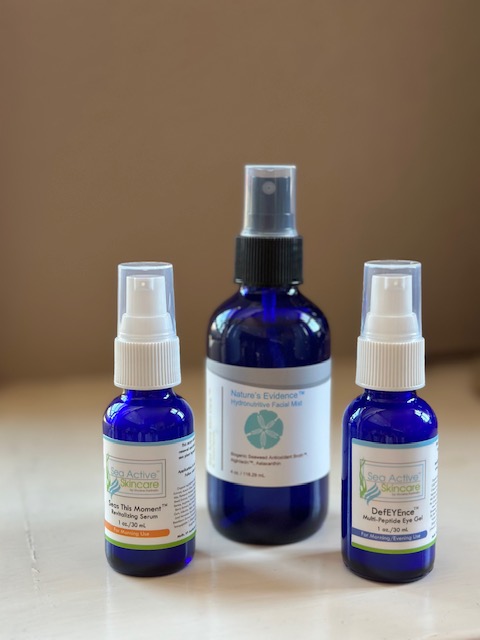Vitamin C is a superstar in the world of skincare. Anyone who’s heard of the skincare game has likely heard of Vitamin C. For some people, Vitamin C is the holy grail for skincare, and it’s not hard to see why. This incredible nutrient has antioxidant and anti-inflammatory properties that can hydrate the skin, improve skin tone and texture, and reduce the visible signs of aging.
Fruits and vegetables are good sources of vitamin C, but there are other ways you can enjoy its benefits to your skin. According to many studies, applying vitamin C to your skin is significantly more effective in making your skin healthy than when you consume it.
Using skincare products with vitamin C can brighten your complexion and protect your skin against sun damage and harmful free radicals. Vitamin C is usually found in face cleansers, serums, and moisturizers.
How Vitamin C Supports Skin Care
Vitamin C, or ascorbic acid, plays a crucial role in keeping your skin healthy. This water-soluble nutrient contains antioxidant, antiaging, anti-pigmentary properties that are clinically proven to have a broad range of benefits, including:
- Making collagen that keeps your skin plump and youthful
- Healing wounds
- Maintaining and repairing damaged skin
- Reducing the appearance of wrinkles and fine lines
- Brightening up complexion
- Making the skin tone even
- Lessening the appearance of dark spots
- Preventing premature signs of aging
How to Use Vitamin C in Skin Care
Whatever your skin type is, vitamin C can benefit your skin by making it look and feel younger and healthier. You can use vitamin C for skincare by nutritional intake or topical application.
Vitamin C Nutritional Intake
Fruits like oranges and berries are rich in vitamin C and can offer many benefits for the skin. However, even if you get plenty of vitamin C through your diet, that amount won’t provide enough for you to enjoy visible improvements on your skin. This is because nutritional intake of vitamin C only reaches the skin’s lower levels and not the top layers. That is why topically applying vitamin C serums is considered the most effective way to reap the benefits of vitamin C to the skin.
Vitamin C Topical
The skin’s topmost layers can directly absorb topical vitamin C, allowing it to work right away by protecting it against free radicals, softening the skin, and lessening the appearance of fine lines and dark spots.
Vitamin C is commonly found in facial moisturizers and serums. But skincare specialists recommend vitamin C serums more than facial moisturizers because serums are more concentrated and more easily absorb by the skin.
Most research suggests that vitamin C is most effective for skin health when you use it as a topical serum. Even serums with low concentrations of vitamin C still contain antioxidant properties that benefit the skin.
If you want to try incorporating vitamin C into your skincare routine but don’t know how and where to start, here’s what your daily skin routine should generally include:
- Facial Cleanser
- Toner
- Vitamin C serum
- Moisturizer
- Sunscreen (for your morning routine)
Make sure to do a patch test on your skin before you go all-in on the vitamin C to check how your skin will react. It’s normal to experience some minor tingling, but if the tingling grows more intense or you get redness, stop using the product and consult your dermatologist.
How Often Should You Use Vitamin C?
To reap the full benefits of Vitamin C, apply it topically once or twice daily, in the morning and at night. Make sure to apply sunscreen with a broad-spectrum SPF after applying vitamin C during the daytime. Carefully follow the instructions on the packaging, as these may vary from product to product. If you think your skin is too sensitive for daily application, start with a low concentration every other day, then build up use as your skin gets used to the ingredient.
Benefits of Vitamin C
There are several benefits to using Vitamin C, including the following:
Reduces the Appearance of Undereye Circles
Dark circles that start appearing under your eyes after a night or two of not getting enough sleep are a network of blood vessels beneath your skin. Researchers who conducted a small clinical study found that vitamin C strengthens the thin and delicate skin under the eyes to help reduce and prevent the appearance of dark circles. The antioxidant properties of vitamin C can improve the elasticity and resilience of the skin to help conceal the blood vessels underneath.
Collagen Production
Vitamin C is vital in the body’s production of collagen, the protein responsible for maintaining the health of the skin, hair, muscles, and tendons. Collagen is crucial in keeping our skin smooth and young-looking. Collagen production slows down with age, which may cause the skin to sag.
The topical application of vitamin C stimulates the production of collagen and elastin, helping your skin stay plump and firm, youthful and smooth, and preventing premature skin aging.
Fades Dark Spots
Hyperpigmentation is a condition that causes the development of dark spots on the skin. The common cause of hyperpigmentation is harmful exposure to ultraviolet (UV) rays, as wells as environmental stresses. Hyperpigmentation is generally harmless, but it can make you look older. A study found that the antioxidant properties of vitamin C play an important role in preventing unwanted dark spots and the signs of aging caused by sun damage.
Vitamin C also prevents hyperpigmentation by hindering the production of tyrosinase, an enzyme that stimulates melanin production. Vitamin C fades excess melanin deposits caused by sun damage and doesn’t affect normal dark skin pigmentation.
Hydrates Skin
The skin’s top layer, also known as the epidermis, can dry out when it lacks moisture. This can cause scaly skin that’s itchy, as well as premature aging. Hydration is, therefore, vital to maintaining healthy and young-looking skin.
Several clinical studies have proven that Vitamin C can help the skin retain water to prevent oiliness or dryness, keeping it plump and smooth. Research also reveals that people who used vitamin C supplements showed notable improvements in the hydration, elasticity, and smoothness of their skin.
Reduces Redness
Blotchy, uneven, and red skin can result from several factors, including sun exposure, hormones, medical conditions, and inflammatory skin conditions like eczema and rosacea.
But fortunately, you don’t have to live with skin redness because there’s vitamin C. Several studies show that the anti-inflammatory and antioxidant properties of vitamin C can reduce skin redness. The nutrient can help you achieve a smoother and more even complexion by helping repair damaged capillaries that cause skin redness.
Several studies have been done on the role of Vitamin C in skincare. Younger people have abundant vitamin C in their skin, but the levels naturally deplete with age. Skincare products with vitamin C are a good supplement to keep your skin firmer and brighter, and your complexion more even.
Vitamin C Rescue Pigment Relief Serum
If you’re looking for an organic vitamin C skincare product for your delicate skin, try C Rescue Pigment Relief Serum by Sea Active Skincare. This serum contains the combined power of seaweed and vitamin C to promote cell regeneration, skin moisturization, collagen production, and reduce the appearance of pigmentation as well as the effect of sun damage. Visit our website today to order!





